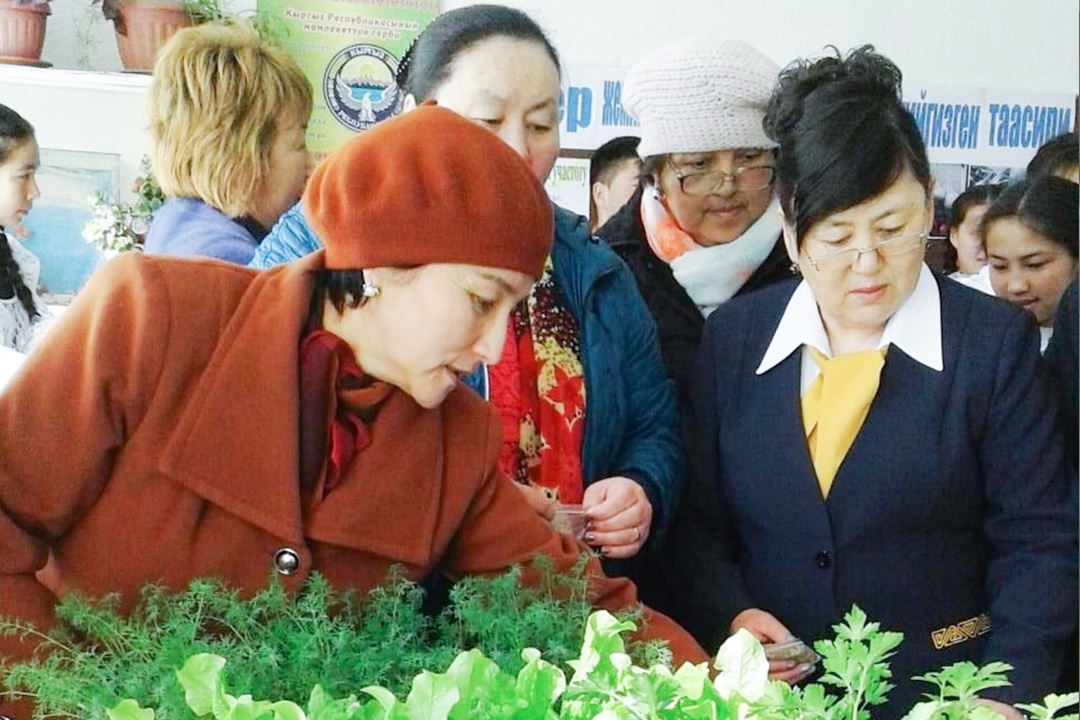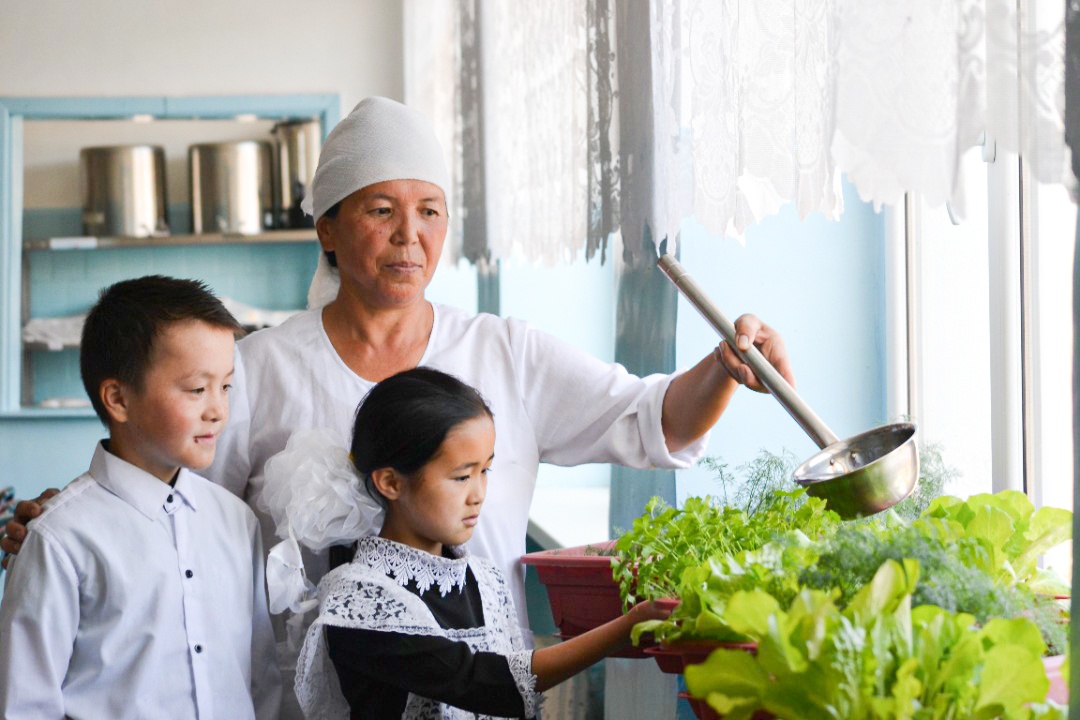Source: DevelopmentAid
30 November 2021
By Ana Benoliel Coutinho
Healthy nutritious food is a basic need for all but it is of even higher importance for children. Schools, which play an important role in children’s nutrition and in the development of their food habits, are often limited in the resources available for healthier diets. In an exclusive interview with DevelopmentAid, Aida Jamangulova, the Director of the Agency for Development Initiatives in Kyrgyzstan, shared how, with the support of the UN World Food Programme, the agency has been able to help to establish school farms that not only allow schools to grow their own food but also to decrease their expenditure and even result in an additional source of income. The ongoing initiative takes this concept further with a project that helps to connect schools with small local producers and thus contribute to the development of rural livelihoods while at the same time ensuring healthier diets for children at school.
Healthy diversified diets at schools
Having sufficient food is not enough. A healthy diet also means diversity that can ensure the supply of all the necessary nutrients for human health. Quality food gives energy but also helps to develop a stronger immune system that protects the human body from a range of diseases. While it is still growing, the human body needs an even healthier diet. This is the case of children and, as they spend a lot of time at school, they consume snacks and at least one hot meal from the school canteen. School also contributes to the development of certain food habits that can be more or less healthy, i.e., less processed, fresher food which includes fruits and vegetables provides children with vitamins while also making them aware of the food varieties typical of their country. This being the case, it is crucial for schools to provide food and meals that will have both a short and long-term impact on children’s health as well as contributing to their food literacy and education.
School farms to provide better food while being an additional source of income
In 2013, the Ministry of Education of Kyrgyzstan together with the UN’s World Food Programme (WFP) decided to join efforts and take the existing law on food further in Kyrgyzstan by offering children hot meals such as soups and porridge. Together they started a school meal optimization program.
One of the components of this program was to create school farms whereby the school sets up its own production system for growing vegetables and other fresh produce. It can be horticultural but also involve poultry, goats, beekeeping, and orchards.

“One of the major benefits for schools to have their own farm is that the food is chemical-free and safer for children. Safety is the priority,” emphasizes Aida.
After a preliminary evaluation of a school’s resources (such as land, access to water) and the capacity to set up and manage a farm, the WFP will give a grant to a school. Some schools already have their own small pieces of land while some received land from the local authorities who found it was easier to give schools access to land rather than support them with food products.
“Depending on their climate and geographical conditions, our organization proposed to write business plans for the schools’ farm projects. So, we taught them the basics of farm management. Then, based on these plans UN WFP gave them grants to purchase everything that was necessary to kick off,” recalls Aida.
She goes on to explain that the main condition was that the school had to use part of this production to prepare school meals while another part could be used for the needs of other schools:
“School farms represent an opportunity for an additional source of income for schools. As they can sell part of what they produce on these farms, now they can buy what is missing for the school meals, for example, cucumbers, tomatoes or other vegetables.”
School farms also help to decrease expenditure on food. Aida stresses the volatility and the increase in the price of food in the last few years. In this context, school farms increase food autonomy and resilience to possible shocks.
The work for school meals continues at different levels including regulation that evolves together with this initiative. Legalizing and formalizing school farms helps to ensure that at least 50% of the production is used for the purpose of producing meals.
Despite all the effort it requires from different actors, “local people are very receptive to this initiative,” concludes Aida.
School gardens for food education
Another important part of this project resides in the creation of school gardens with educational goals involving children. Unlike school farms, later have to be on the school’s territory. Aida explains that this helps children to learn about the specifics of each region, its climate, and agricultural systems:

“School gardens with educational goals are part of the education process. Children learn to grow certain foods there. It is part of the natural sciences program but also helps them to learn how different crops grow.”
Aida emphasizes that these skills are very important as many people received land in the post-Soviet period but did not know what to do with it. People who previously worked as teachers or engineers now had to learn about agriculture:
“The state gave people land basically saying that now people need to provide for themselves,” she adds.
Therefore, knowing how to grow your own food not only increases awareness but also can contribute to food autonomy at the household level and helps many people to re-establish a connection with their land through food production.
As part of this project, 83 local schools were involved in creating or improving their school gardens, out of which 27 received grants for school farms.
Future perspectives for safe nutrition at schools
The Agency for Development Initiatives (ADI) is currently conducting a feasibility study for a project within the framework of the ‘Home Grown School Feeding’ FAO programme which will help to connect small producers and school canteens. The advantage of this approach is that schools will not need to manage farms but will deal directly with small local producers:
“They are involved from the very beginning. Together with farmers, schools are deciding what they need and how much they need of certain products.”
Within the framework of this project, there is also an intention from FAO «From Protection to Production» programme to link homegrown school feeding with vulnerable groups, for instance, for schools to work with small producers such as single mothers:
“At the moment we are analyzing the situation on both sides: at school – what are their resources, their needs in terms of food provision. On the other side: we already collected the data from the people receiving social help and what they can cultivate, and whether they have what schools need,” shares Aida.
The agency is currently looking at logistics, storage, and procurement procedures – all aspects necessary to organize this system of collaboration which brings benefits to all the participants:
“Such agreements can bring more stability to small producers, ensuring their income, while also ensuring local and fresh food for children at school,” concludes Aida.


